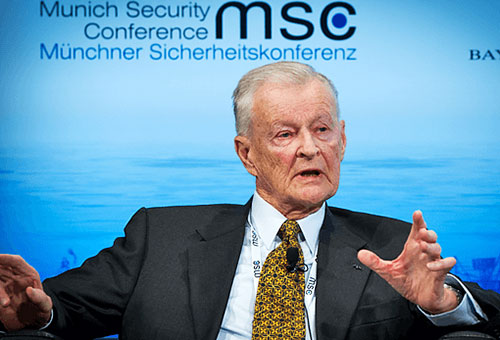|
August 25, 2016
distributed under a
CC-BY 2.0 license.
While Zbigniew Brzezinski's article in The American Interest (AI) titled "Towards a Global Realignment" has largely been ignored by the media, it shows that powerful members of the policymaking establishment no longer believe that Washington will prevail in its quest to extent US hegemony across the Middle East and Asia.
Brzezinski, who was the main proponent of this idea and who drew up the blueprint for imperial expansion in his 1997 book The Grand Chessboard - American Primacy and its Geostrategic Imperatives, has done an about-face and called for a dramatic revising of the strategy.
Here's an excerpt from the article in the AI:
Repeat: The US is "no longer the globally imperial power..."
Compare this assessment to a statement Brzezinski made years earlier in Chessboard when he claimed the US was "the world's paramount power."
Here's more from the article in the AI:
But why is "that era is now ending"? What's changed since 1997 when Brzezinski referred to the US as the "world's paramount power"?
Brzezinski points to,
...as the proximate causes of this sudden reversal.
His comments on Islam are particularly instructive in that he provides a rational explanation for terrorism rather than the typical government boilerplate about "hating our freedoms."
To his credit, Brzezinski sees the outbreak of terror as the "welling up of historical grievances" (from "deeply felt sense of injustice") not as the mindless violence of fanatical psychopaths.
Naturally, in a short 1,500-word article, Brzezniski can't cover all the challenges (or threats) the US might face in the future.
But it's clear that what he's most worried about is the strengthening of economic, political and military ties between Russia, China, Iran, Turkey and the other Central Asian states.
This is his main area of concern, in fact, he even anticipated this problem in 1997 when he wrote Chessboard.
Here's what he said:
"…prevent collusion… among the vassals..." That says it all, doesn't it?
The Obama administration's reckless foreign policy, particularly the toppling of governments in Libya and Ukraine, has greatly accelerated the rate at which these anti-American coalitions have formed.
In other words, Washington's enemies have emerged in response to Washington's behavior. Obama can only blame himself...
Russian Federation President Vladimir Putin has responded to the growing threat of regional instability and the placing of NATO forces on Russia's borders by strengthening alliances with countries on Russia's perimeter and across the Middle East.
At the same time, Putin and his colleagues in the BRICS (Brazil, Russia, India, China and South Africa) countries have established an alternate banking system (BRICS Bank and AIIB) that will eventually challenge the dollar-dominated system that is the source of US global power.
This is why Brzezinski has done a quick 180 and abandoned the plan for US hegemony; it is because he is concerned about the dangers of a non-dollar-based system arising among the developing and unaligned countries that would replace the western Central Bank oligopoly.
If that happens, then the US will lose its stranglehold on the global economy and the extortionist system whereby fishwrap greenbacks are exchanged for valuable goods and services will come to an end.
Unfortunately, Brzezinski's more cautious approach is not likely to be followed by presidential-favorite Hillary Clinton who is a firm believer in imperial expansion through force of arms.
It was Clinton who first introduced "pivot" to the strategic lexicon in a speech she gave in 2010 titled "America's Pacific Century".
Here's an excerpt from the speech that appeared in Foreign Policy magazine:
Compare Clinton's speech to comments Brzezinski made in Chessboard 14 years earlier:
The strategic objectives are identical, the only difference is that Brzezinski has made a course correction based on changing circumstances and the growing resistance to US bullying, domination and sanctions.
We have not yet reached the tipping point for US primacy, but that day is fast approaching and Brzezinski knows it.
In contrast, Clinton is still fully-committed to expanding US hegemony across Asia.
She doesn't understand the risks this poses for the country or the world. She's going to persist with the interventions until the US war-making juggernaut is stopped dead-in-its-tracks which, judging by her hyperbolic rhetoric, will probably happen some time in her first term.
Brzezinski presents a rational but self-serving plan to climb-down, minimize future conflicts, avoid a nuclear conflagration and preserve the global order (aka The "dollar system").
But will bloodthirsty Hillary follow his advice?
Not a chance...
|


